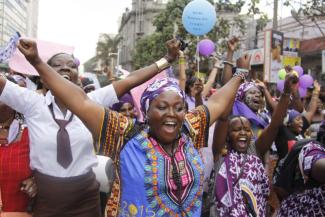Female Genital Mutilation
100 million women affected
 AP Photo/picture-alliance
African women demonstrating in Nairobi against female genital mutilation and other forms of violence.
AP Photo/picture-alliance
African women demonstrating in Nairobi against female genital mutilation and other forms of violence.
The practice is especially common in sub-Saharan Africa as well as in some Arab and south-east Asian countries. However, cases have also been reported in Europe, Canada and the USA. In Africa, 3 million girls are at risk of undergoing FGM every year. Terres des Femmes, a women’s rights organisation, reckons that around 36,000 women affected by FGM live in Germany and that almost 6,000 women and girls are at risk of being subjected to it. Female genital mutilation (FGM) comprises all procedures that involve partial or total removal of the external female genitalia, or other injury to the female genital organs for non-medical reasons. The practice violates human rights and impairs the health of girls and women. It mainly affects babies and girls from a few months to 14 years of age. They have no say in the matter. In most cases, FGM is performed before the 18th birthday.
Female genital mutilation is closely related to concepts of identity, sexuality, gender and power. The phenomenon is linked to the norms and beliefs of various communities. Common justifications include initiation rites, the preservation of virginity, FGM as prerequisite for marriage, identity, conjugal fidelity, honour, hygiene, purity, greater fertility and religion. In FGM practicing communities, circumcised women are highly appreciated. Uncircumcised women, however, are stigmatised and marginalised by their families, their friends and their entire social environment.
Terre des Femmes has been active for 30 years and – apart from working on other key issues such as honour crimes and forced marriages, domestic and sexual violence and trafficking of women – continually pursues its goal to end FGM. Our vision is equality, self-determination and freedom for girls and women worldwide. We are committed to ensure that the UN Resolution on Ending FGM is implemented all over the world.
Idah Nabateregga works in the FGM department of Terre des Femmes.
genitalverstuemmelung@frauenrechte.de
Link:
Terre des Femmes:
http://www.frauenrechte.de/online/index.php/home-engl

